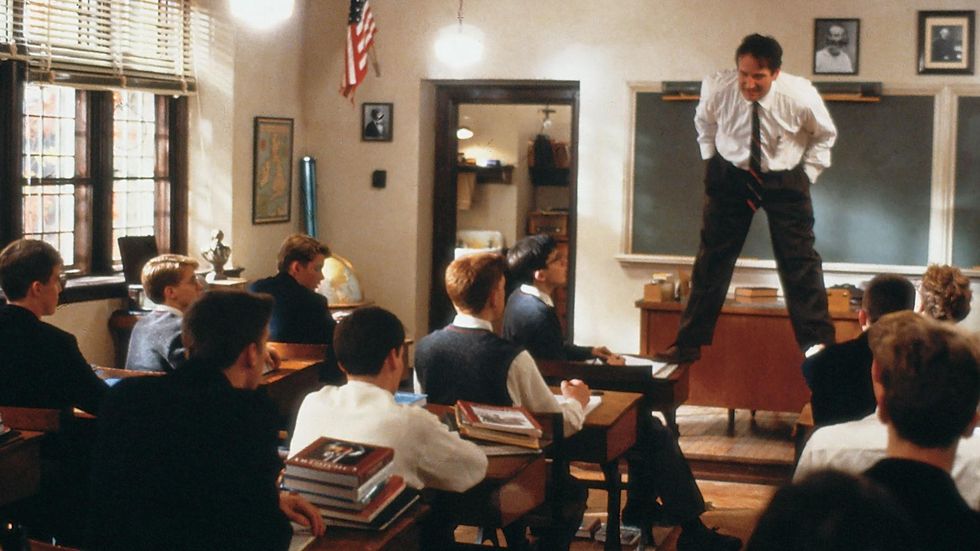
In the golden era of digital content, the allure of film school is undeniable for aspiring filmmakers. It promises the secrets of cinematic mastery, a gateway to the glittering world of movies and television.
But then they send you the bills, and if you’re like me, you’ll be in debt for a long time because of them.
The ability to learn filmmaking from the comfort of your home, without spending a fortune, is more possible now than ever before.
It’s the mission of this website to do just that, so I wanted to show you all what a basic film school curriculum looks like and then link you to all our articles that will basically teach you the same thing.
Let’s dive in.
Free Film School Curriculum

A typical film school curriculum is designed to provide a comprehensive education in the various aspects of filmmaking. It generally includes both theoretical and practical components, covering a wide range of topics.
Here’s an overview of what you can get here for free:
- Foundations of Filmmaking
- Storytelling Techniques: Exploring narrative structures, character development, and thematic elements.
- Scriptwriting Basics: Learning script format, dialogue writing, and screenplay development.
- Film Crew Roles and Responsibilities: Understanding the different positions on a film set and their functions (e.g., director, cinematographer, editor, sound technician).
- Technical Skills
- Cinematography: Studying camera types, shot composition, camera movement, and lighting techniques.
- Lighting for Film: Understanding the use of natural light and artificial light to set the mood and tone of a scene.
- Sound Design: Learning about sound recording, sound effects, and creating an audio landscape.
- Film Editing: Techniques for cutting, sequencing, and transitioning scenes using editing software.
- Directing and Production
- Directing Actors: Methods for working with actors, conducting rehearsals, and eliciting strong performances.
- Set Management: Organizing and managing a film set, including scheduling and crew coordination.
- Film Production Logistics: Budgeting, scheduling, and location scouting.
- History and Theory
- History of Cinema: Film history tracing the evolution of film from silent movies to the present day.
- Film Genres and Styles: Exploring different genres (e.g., noir, Western, sci-fi) and stylistic movements (e.g., Italian Neorealism, French New Wave), and film theory.
- Film Criticism and Analysis: Learning to analyze and critique films from various perspectives.
- Specialization Areas
- Documentary Filmmaking: Techniques specific to nonfiction storytelling, research, and interview skills.
- Animation: Basics of animation, storyboarding for animated films, and using animation software.
- Visual Effects and Special Effects: Creating digital and practical effects for enhancing visual storytelling.
- Practical Experience
- Short Film Production: Hands-on experience in planning a short film, writing a short film, shooting a short, and editing a short film.
- Collaborative Projects: Working in groups to simulate real-world film production scenarios.
- Film Workshops: Practical workshops focusing on specific skills like camera operation, lighting, or editing.
- Industry Knowledge
- Film Distribution: Understanding distribution channels, streaming platforms, and theatrical releases.
- Film Marketing and Promotion: Techniques for marketing films, creating press kits, and utilizing social media.
- Film Festival Strategies: Learning about film festival submissions, networking, and showcasing work.
These specific topics provide a detailed road map for students embarking on a comprehensive film education, covering both the artistic and practical aspects of the craft.
As you can see, this site has a ton of free resources for you. And you can even dive way deeper into those articles and their offshoots to get the answers you need.
I’ve worked in Hollywood for over a decade, and no one has ever checked to see if I have a college degree. While some jobs at agencies may require that you have one, it might be easier to break into Hollywood if you get a degree that allows you to have a day job and make more money, and then pursue your passions on the side.
Remember, the path to becoming a filmmaker is as unique as the stories you wish to tell. While film school offers a structured environment, the self-taught route is customizable, flexible, and driven by your personal pace and passion.
So, arm yourself with these resources, let your creativity flow, and step into the world of filmmaking with confidence and curiosity.
Your cinematic journey begins now!
Author: Jason Hellerman
This article comes from No Film School and can be read on the original site.
